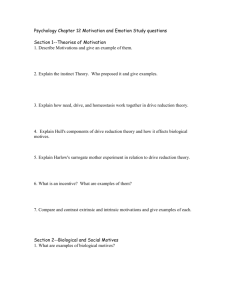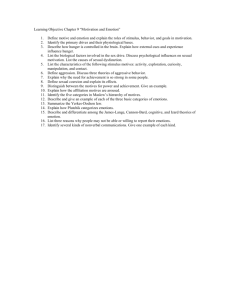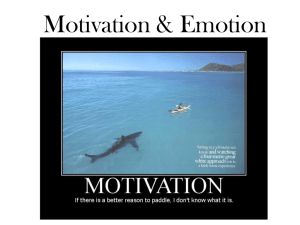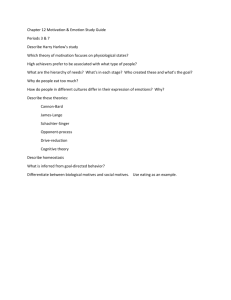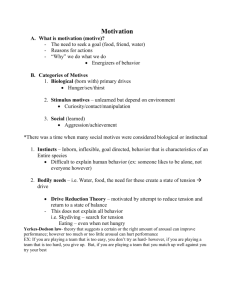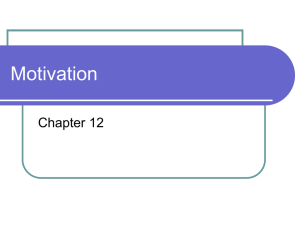File
advertisement
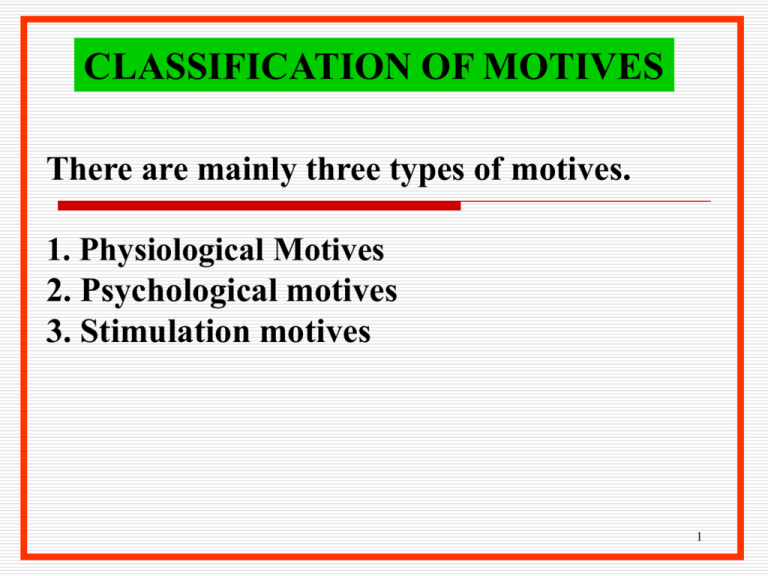
CLASSIFICATION OF MOTIVES There are mainly three types of motives. 1. Physiological Motives 2. Psychological motives 3. Stimulation motives 1 PHYSIOLOGICAL MOTIVES • These are called biological or primary motives as well. • The biological motives to a large extent, rooted in the physiological state of the body. • There are many such motives, including hunger, thirst, a desire for sex, temperature regulation, sleep, pain avoidance, need for oxygen etc. 2 PHYSIOLOGICAL MOTIVES • They body tends to maintain a state of equilibrium called “homeostasis” in many of its internal physiological processes. • This balance is crucial for life. • Body temperature must not too high, not too low, the blood must not he too alkaline or too acidic. • There must he enough water in body tissues. 3 PHYSIOLOGICAL MOTIVES • Falling temperature leads to a “motivated behavior”—putting on a sweater, turning up the thermostat, closing the window, and so on. • When the body lacks substances such as food and water, automatic physiological processes go to work to conserve the substances that are lacking, but sooner or later water and food must be obtained from the outside. 4 1- NEED FOR OXYGEN • • • • This is the first and basic biological motive. Oxygen is the basic need for human survival. Oxygen is abundantly available in the air. we are continuously breathing it that is why we are not aware with its importance. • Asthmatic patients better know that how crucial is the time when they are unable to breath well. 5 2- HUNGER (NEED FOR FOOD) The sources of hunger are various. a) Stomach contraction b) Dissolved nutrients in the blood c) Glucose or blood sugar d) Hypothalamus 6 HUNGER STOMACH CONTRACTION When the stomach is empty, contractions occur and are sensed; the sensed contractions were said to be the signal for feeling of hunger. 7 HUNGER DISSOLVED NUTRIENTS IN THE BLOOD. Most investigations of hunger motivation now believe that levels or rates of use of dissolved nutritive substances circulating in the blood are crucial for the activation of feeding. 8 HUNGER GLUCOSE OR BLOOD SUGAR. • An important substance involved in the initiation of hunger motivation and feeding. • It has long been known that injections of the hormone insulin, which lowers levels of circulating blood sugar, will induce hunger and eating. 9 HUNGER HYPOTHALAMUS • A part of brain that is critically involved in hunger motivation and in a number of other biological motives. • Investigators have proposed that the receptors for glucose and other fuels are in the liver and that information about the blood nutrients is carried to the brain along the nerve pathways connecting liver and brain. 10 3- THIRST • What drives us to drink? (water). • Stimulus factors play a very large role in initiating drinking. • We went to drink a good beverage. • Pulled by stimuli and incentives, we tend to drink more than the body needs, but it is easy for the kidneys to get rid of the excess fluid. 11 THIRST • The body’s water level is maintained by physiological events in which several hormones play a vital role. • One of these is the ant diuretic hormone (ADH), which regulates the loss of water through kidneys. • The physiological mechanisms involved in maintaining the body’s water level are not directly involved in thirst motivation and drinking. 12 4- Sexual Motivation 13 5- BODY TEMPERATURE • It is important because if the body temperature is too low or too high it can cause death of a person. • Normal body temperature is 9E3.6F/37 Degree Celsius. • Homeostasis plays important role in maintaining our body temperature. • If our body temperature is increasing, homeostasis increase our perspiration and thus causing our body to cool down. 14 BODY TEMPERATURE • If our body temperature is decreasing then our body starts shivering in order to generate heat. • If there is excess temperature then we turn on our Air conditioner if temperature is low then we put on some jackets or turn on heaters etc. 15 6- FATIGUE • Fatigue is physical or mental anxiety. • One hour mental stress is more tiring than several hours’ physical fatigue. • We require rest or work pauses in order to remain in the balanced state of arousal. 16 7- SLEEP • Body requires 3 to 4 hours sleep in 24 hours in order to survive. • Normal requirement is 6 to 8 hours sleep for normal physical and mental health. 17 8- MATERNAL INSTINCT • This is parental love “MAAMTA, in Urdu”. • This is present in both male and female. • Maternal instinct increased by the secretion of a hormone called prolectin. • Prolectin are released from anterior pituitary gland. • Secretion of prolectin starts after marriage in human beings. 18 9- PAIN Whenever we are in pain, our motive is to remove this pain either by taking rest or having medicine or from any other source. 19 10- EXCRETION OF WASTE PRODUCTS It is our motive to get undigested food and extra fluids drained out of the body. 20
